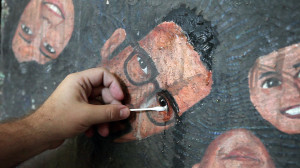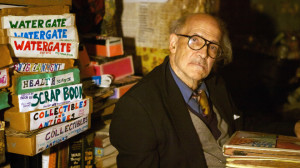 Review: Wisconsin Film Festival
Review: Wisconsin Film Festival
Almost There | Dan Rybicky, Aaron Wickenden | USA | 2014 | 93 min
Wisconsin Film Festival, Sundance Cinemas, Monday, April 13, 6:00pm»
Wisconsin Film Festival, Sundance Cinemas, Tuesday, April 14, 1:30pm»
You need to suffer to turn out to be good. It takes you to learn from your suffering. You learn from mistakes. You learn from your past. It’s called fortitude. I am going to suffer for the rest of my life. I accepted that. — Peter Anton
Never were truer words spoken than in the documentary Almost There, which depicts the life of outsider artist, Peter Anton. While certainly not the first film of its kind to take a probing look at outsider artists (In the Realms of the Unreal, Marwencol), Almost There examines the life of a still living subject who is, in essence, a work in progress.
 First-time filmmakers, Dan Rybicky and Aaron Wickenden stumble across Peter Anton’s portrait booth during a pierogi festival in East Chicago, Indiana in 2005. They discover that Anton has been documenting his life through pictures and hand written notes, which he keeps in homemade scrapbooks spanning through decades. Their interest is piqued and Anton is desirous for his story to be told so the pair embark on a journey to display Anton’s artwork to the world.
First-time filmmakers, Dan Rybicky and Aaron Wickenden stumble across Peter Anton’s portrait booth during a pierogi festival in East Chicago, Indiana in 2005. They discover that Anton has been documenting his life through pictures and hand written notes, which he keeps in homemade scrapbooks spanning through decades. Their interest is piqued and Anton is desirous for his story to be told so the pair embark on a journey to display Anton’s artwork to the world.
Rust belt America is not a sought out destination for many travelers, and East Chicago, Indiana was hit particularly hard by the loss of manufacturing jobs. The landscape is rife with abandoned properties and shuttered factories. Peter Anton’s home is dilapidated and clearly on the verge of being condemned. What Rybicky and Wickenden find there is astounding. There does seem to be a method to the madness. Amidst the mold and rotting structure of the basement, Anton has kept a series of videotapes, detailed collages, and countless paintings throughout the years. These treasures are in danger of being destroyed as the home crumbles, and soon the documentarians find themselves helping Anton hold his first solo exhibition at the age of 83.
The interplay between the filmmakers and Anton borders on co-dependent. Purists may quibble about the thin line between documenting a subject and becoming the subjects. Anton is elderly, ailing, and has driven away those who have tried to help him. Rybicky includes a parallel narrative involving members of his own family which really only serves to distract from the subject at hand while further entangling himself in an already sticky situation. Up until this point, the storytelling is taut and engaging. Rybicky missteps here as the footage of his family adds little if anything to the film, and the parallel he draws between his situation and Anton’s is flimsy at best. Rybicky clearly has some misgivings about his relationships with his family that are illuminated with his relationship to Anton, but when he tries to confront his personal demons on film, it feels rushed and insincere. While the film does not feel padded, the smooth pace falls off here and the story becomes less interesting.
Almost There asks the viewer to consider compelling questions about humanity and morality, including: to what extent does the past really remain in the past? Without the aid of Rybicky and Wickenden, Anton’s work surely would have been buried under a pile of rotting wood in his decaying home. One could ask, what other secrets would have been buried there? Ethically, this film challenges viewers to examine the duties we have to help those who need assistance and balance the need to reconcile their past sins. I think Almost There does a great job of examining this ambiguity. Viewers are definitely left with issues and ideas to mull over during the end credits. Q&A sessions with the filmmakers are scheduled after both Wisconsin Film Festival screenings.
This film is fascinating and people who appreciate stories about those on the fringes of society will enjoy it. Ultimately, Rybicky and Wickenden were able to tell Anton’s story and did so successfully. Are there some gaps and loose ends? Yes, but not to the detriment of the film. Viewers will take away that suffering refuses to be packaged up with a neat little bow. There are indeed times when people have to be able to sit with ambiguity no matter how uncomfortable it may be. Nothing really is black or white. Peter Anton’s story and perhaps all of our stories can be found in the shades between.
Thanks for writing such a thoughtful review about our film! One question: Could you fix the spelling of my last name? It’s ‘Rybicky’ not ‘Rybicki.’
Thanks again!
Dan,
I will pass along the kind words to Edwanike, and thank you for the re-tweet on Twitter. I will also have a stern word with the editor for not catching the misspelled name–oh wait, that was me. Many apologies from someone who often has his name misspelled (most often KRUEL).
Enjoy your time in Madison, I’m confident you’ll find the audiences very receptive.
Jim Kreul
Madison Film Forum
Thanks so much, Jim! We love Madison and can’t wait to share our film with the folks of your fine city soon!!